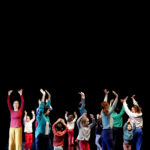China project
Unexpected scene
China Project, the multi-year project of artist residencies for Italian artists in China and Chinese artists in Italy, was reactivated last December with new artists selected for a residency period in Chongqing, at the campus of the Sichuan Fine Arts Institute as part of the RIVA Project, curated and directed by Valentina Gensini, in collaboration with Zhong Art International and Sichuan Fine Arts Institute.
The artists selected in 2023 are Leone Contini and photographers Edoardo Delille and Giulia Piermartiri.
The work of photographers Edoardo Delille and Giulia Piermartiri stems from important questions about the future geography that the new generations will face. Due to climate change, the world map has undergone radical transformations, and from here arises the need for the two photographers to show the future through the photographic medium. The Atlas of the World project stems from these fundamental questions. Based on a study conducted in the United Nations databases, the two photographers have searched for landscapes that could represent these changes, combining the photographic technique of superimposition with the projection of images from a slide projector. Scenes of real life merge with projected landscapes, thus making climate change perceptible, becoming a metaphor for a not-too-distant future. The China Project adds a new chapter on Sichuan and the floods in southern China.
Unexpected Landscapes in Daxuecheng is part of a flow of research that Leone Contini has been carrying out for years, about forms of peri-urban and interstitial agriculture, starting from the Prato-Florentine plain, his neighbourhood, where omnipresent Chinese vegetable gardens are subjected to media controversy, despite their fundamental role in incrementing bio-diversity and new knowledge. Urban agriculture in the university district of Daxuecheng, located on the outer edges of the Chongquing megalopolis, is also a contested and in some cases prohibited (but tolerated) practice, although for completely different reasons. In both cases the rural practices of urban farmers respond to fundamental needs, and assert an unexpected landscape. Contini’s encounter with both the urban and agricultural dimensions of Chongquing and Sichuan stimulated his research on emerging rural landscapes, landscapes in the making, in contrast to landscapes that we could define as hegemonic and fully codified.



